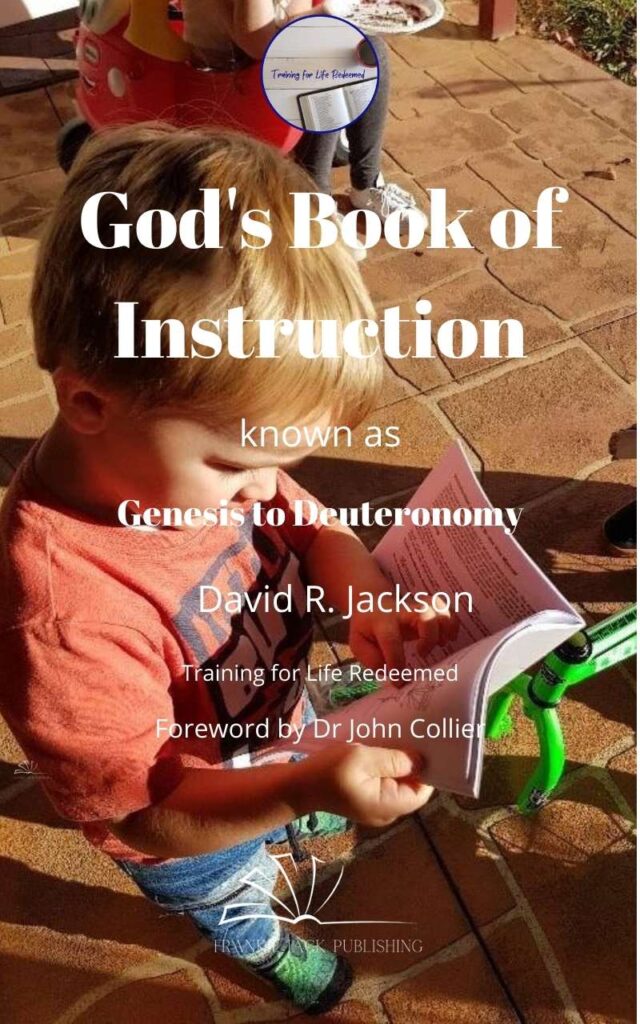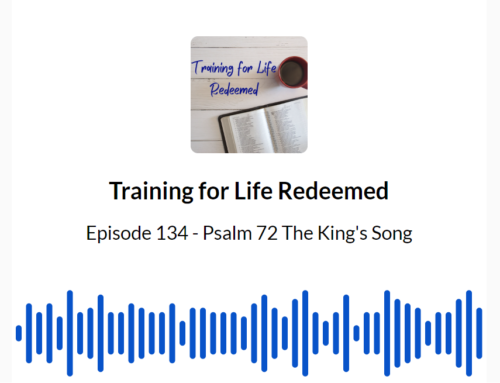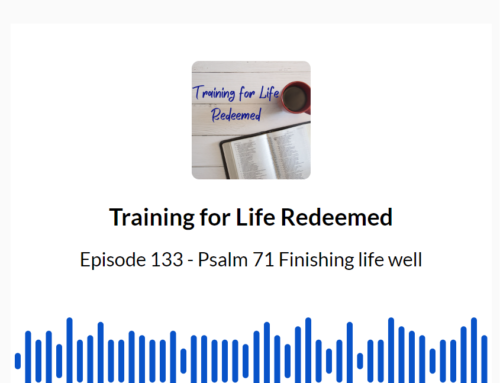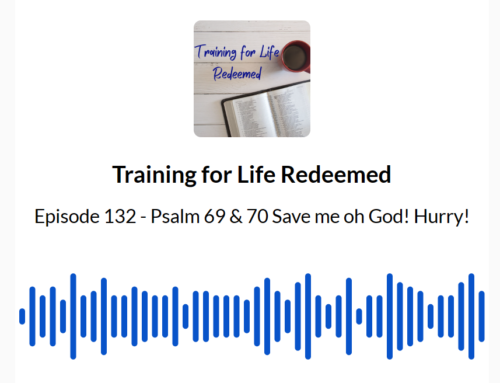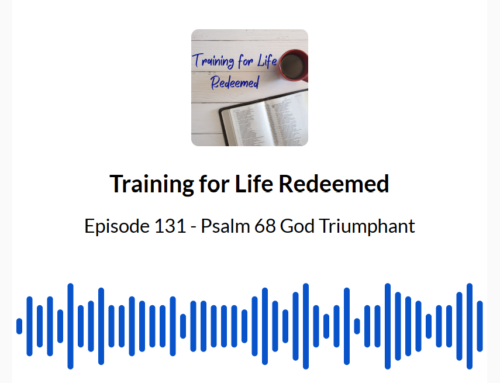Grab your notes for this episode by completing the form
and we will send you the link to all our notes.
Get the book “God’s Book of Instruction” on Amazon.
The first five books of the Old Testament constitute God’s book of instructions for his redeemed people. It reveals the character of God and his good design for life. It bears witness to the beginning of his work of redemption. It equips the believer to live in God’s world, God’s way, as God’s image for God’s glory. What sin and death have broken, God’s people can rebuild by keeping to his instructions by the power of his presence with us.
Transcript
Dan:
Hello, and welcome to episode 16 of training for life redeemed. I’m Dan , your host, and I’m here with my dad, David Jackson. In this series of episodes, we are working through Exodus, Leviticus and Numbers, looking at the different areas of Israel’s life that had to be put back together. Last time we looked at God’s instructions for a redeemed lifestyle. In this episode, we are looking at how God taught his people to apply his instructions in new situations, where they had to work things out for themselves. Now we’re getting to some fairly pedantic and strange issues in these passages. Dad. I think we find some of the examples, embarrassing. They certainly don’t relate easily to our values or culture. Why are these ancient and weird instructions there ? They don’t seem to have anything to do with us.
David:
When you issue a law, even in our state legislation and federal legislation, the problem becomes, how do I interpret the law in a situation that’s messy. And every situation in life where we are called to obey God, sin has made life messy, and it’s easy to get confused about what we’re supposed to do. So what God does in the Torah is he, he issues his commandments, but then he issues judgements and lifestyle customs that people that will help people do that. They’re like in our law courts, we call them setting a precedent. So you’ll bring a particular argument to court to say, this is how I think the law applies. The judge would issue a ruling. Once the judge has issued that ruling, then all other judges have to pretty much follow along his decision or her decision about how to interpret the law. So we get a whole range of what if situations, if you’re told, you know, murder , you’re not allowed to commit murder, o r the next question is, well, w hen’s it murder? What if, what if it’s an accident? What if it was by negligence? What if my dog got out and killed the neighbor, you know, in a car crash, how do you decide whether it’s murder or something else? They, so we have case studies, the case studies are written for where Israel was at the time and the sorts of cases they would have to come up against. What we need to do is look at those case studies and see how they apply to our funny particular circumstances. And that will work across every culture in all times. It’s a , it’s a bit messy, but we’ve got to go through that process and think through, if there’s a commandment against adultery, we’ve got to go and work through all the case studies on sex to work out how you apply that command. And when a certain circumstance comes up, we go back to those case studies and say, well, God, what do you want us to do with this mess?
Dan:
Okay. Well, in principle, that makes sense. But let’s have a look at a couple of examples, maybe. Yeah . How about Deuteronomy 22:6? And it says, if you happen to come across a bird’s nest along the way, blah, blah, blah, you should not take the mother sitting on the young so I can take the eggs basically, but I can’t take the mum.
David:
Pretty much. So this is God’s world, the soil, the plants, all our living creatures are his. We were sent to take care of his property instead we’ve done an outstanding job of destroying it. So this is about preventing the extinction of God’s creatures. There are lots of other instructions about giving the land a rest, not sucking the nutrients out of the soil in some greedy quest for more. If we paid more attention to what God’s teaching us in these so-called weird instructions in the old Testament, Christians would have taken the initiative and presented the world with a far better basis and approach to all the issues surrounding the environment. We look at pollution, we look at how we affect the climate. The Bible has lots to say about that. Most of it is in the old Testament Torah. So we’ve enjoyed and ignored God’s instructions. And Christians have said all that stuff doesn’t matter, but it’s there in the Scriptures. So it does matter. We’ve let a godless world come up with their solutions. And when godless world comes up with solutions, those solutions create more damage. And this just goes on for a whole range of issues, not just environmental, but social and you think of. All the Bible says about domestic violence, sexual relationships, financial abuse. We need to go back and pay a bit more attention to how that all works out. And some of the pedantic details are fascinating.
Dan:
So how do all these case studies then have anything to do with Jesus? The gospel? That’s kind of when you read it, it sound like a bunch of random rules.
David:
Yeah. Well, random rules are for like school uniforms, nothing more random than that, but Jesus is, Yahweh. He is the God who brought these people out of Egypt. And he is the creator. God and John tells us all things came into being through him. Apart from him, nothing came into being that has come into being, and he didn’t just save people. He saved the whole creation by taking away our sin, he started a new humanity that would rule his new creation his way. So we’re here to display his character and the kingdom of God over which Jesus is the new man. As we do that, Jesus has enabled us to live out this new way of living to undo the damage. And these, these little case studies that we’ve got here , get us down to the nitty-gritty of how we can fix. We had a , you remember the deputy principal we had at school, John Goldsmith, we’ll honour the man, one of John D . He was a great deputy. Okay .
Dan:
If you were a student here around the corner.
David:
Yeah. The trouble with John Goldsmith was if you hid around the corner, he could see you [inaudible] . But he was a lovely, lovely man. And the kids loved him and they respected him. And one of the reasons, one of the basis for his management of behavior in a high school was the little, this little one liner. If you take care of the little things, the big things will take care of themselves. If you take care of the pedantic, if you take care of the small crimes, we won’t be doing the big ones. If you teach kids to get the little things right, they won’t make big mistakes and that’s not legalism that’s wisdom. It means that we just don’t overlook things that are going to grow like that , mould in the wall to the point where it demolishes the whole house. And we take care of i t. It nip it in the bud, as it were.
Dan:
The Bible gets a pretty bad rap though, too Dad, like there’s a lot of teachings in here about sex. You need to be a Virgin for, you know , until you get married all that kind of stuff. And generally people kind of bag out Christians for that. But how are these rules actually good?
David:
All right, well, let’s start off by just taking the Mickey out of this whole criticism. If we look around at the way sexual relationships are working now, I hardly think that the people advocating for this sort of a lifestyle are standing on high moral ground because we’re looking at people getting powerfully, powerfully damaged by tearing out the way God designed six to work and just giving free reign . And there is no more, no more hurt or damaging thing that you can do to somebody more than violating them sexually. That creates the greatest damage. We deal with that in our culture and it’s on the increase and we hear the screams and we hear the pain, but we’re not seeing any solutions. And we’re not seeing the solutions because we’re trying to catch the horse. After we opened the gate. If we go back to Torah and we look at God’s design for sex you’ll , if you understood these instructions in the culture at the time, it’s as if God’s bending over backwards to protect the vulnerable. And the most vulnerable here are women. And we all know that nothing really has changed. Men, take advantage of women. The men are the penetrators and the women are the ones the other end of it. And it’s a , it’s a great act of trust to enter into a sexual relationship and men just walk away and violate that trust. And the Bible is screaming about, do this lifestyle and prevent that from happening. And yes, those rules are pretty strict. Those guidelines, those boundaries are very strict. We are terrible at observing boundaries. We have a culture of, we talk about the boys club where men can do things to women and the response , the Australian of the year lady, I think it was said the other day. And now these men can say all these things and do all these things. And if we want to raise our voice, they’ll tell us to suck it up buttercup. That’s not the Bible’s answer. God is enraged when people violate other people sexually. So we need to go back. And yes, it’s challenging to rethink where those boundaries should be. It does restrict free access sexually to anybody we like, but then it reminds us that when we have that free access and we walk away from people, we leave people broken. I don’t like swear language. I don’t like foul language, the Bible objects to it. But let me just point out when you simply sit and think about all the language that we use in our slang language for having sex, nearly all of the words are words that describe damage. You, you’ve only got to think about the word that you use for having sex is the same word you used for a car that broke down. Both are F’d, they’re banged, they’re screwed, they’re knocked and their F’d and all of that language is violent. And that says a great deal about the people who want to stand on the high ground and tell us this Bible is somehow sexually outrageous. Bible’s about protecting God’s image and God’s image includes women and kids.
Dan:
Well, the more we get into these books, the more we see God’s character and design for all of life. It isn’t just about believing the truth. It is also about changing our hearts and minds to reflect the character of God. As we revealed to us in his words, and in the person of Jesus, we’re going to have to rethink everything. And these case studies are vital helping us to do that. Jesus and the rise of the new Testament help us to apply these case studies to other cultures And new times. This week, we are going to face some interesting values and expectations Some time ago, Christians were priceless with the letters WWJD, what would Jesus do? Perhaps we answered that question by assuming Jesus would do something nice that he would approve what we would want to do anyway, instead, let’s ask him to show us through the scriptures, how we can bring his grace and salvation to bear on the little things of the week. But if you’ve enjoyed this episode, please make sure that you hit the subscribe button. And if you want to grab the study notes for today’s episode, please head over to trainingforliferedeemed. com/1 6, and you can grab all the things that you need there. Thanks for listening.
